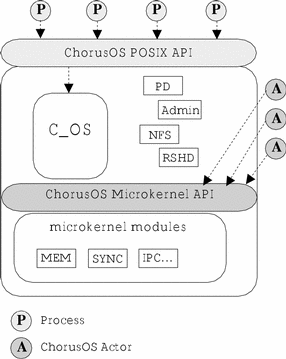ChorusOS Application Types
Within the ChorusOS operating system environment, an application is a program or a set of programs usually written in C or C++. An application must be loaded on the ChorusOS runtime system to run. The normal unit of loading is called an actor or a process. It is loaded from a binary file located on the host machine or on a ramdisk or physical disk on the target.
Applications are loaded from binary files, which can be either absolute or relocatable. In an absolute binary, all addresses have been resolved and computed from a well-known, fixed basis that cannot be changed. A relocatable binary can be loaded or relocated at any address. Absolute binaries are executed in place in the system image and are built from standard relocatable binaries when building the system image. Absolute binaries cannot use dynamic or shared libraries.
Both user and supervisor applications can be loaded from either absolute or relocatable binary files. Common practice is to load them from relocatable files to avoid a static partitioning of the common supervisor address space, and to enable the loading of user applications into the address space in the flat memory model.
Whether an application is defined as an actor or a process is determined by the set of APIs to which the application has access. The ChorusOS APIs are discussed in detail in "ChorusOS APIs". For now, it is sufficient to know that there are two main sets of APIs:
-
POSIX APIs
-
Microkernel APIs
Applications that have access to the POSIX API are called processes while applications that have access to the Microkernel API are called actors. This distinction is illustrated in Figure 3-1.
Figure 3-1 Actors, Processes and the ChorusOS APIs

- © 2010, Oracle Corporation and/or its affiliates
